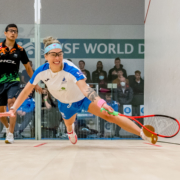The road to Birmingham 2022- Lisa Aitken’s story
Lisa Aitken is one of Scotland’s most decorated squash athletes, having already competed at two Commonwealth Games – Delhi and Australia in 2010 and 2018 – and having just been selected to represent Scotland again at Birmingham 22 this August.
The Games represent the pinnacle for any athlete. They only come around once every four years and provide a unique opportunity to showcase a range of different sports to the world. As in any elite sport, the difference between winning and losing is measured by the smallest of margins, and Lisa knows more than most that good preparation is often the key to success.
Lisa spoke to us candidly about how she is preparing for her third games, covering a range of areas from diet and hydration to training, sleep and psychology. She shares her top tips on how to fine tune body and mind to be in peak condition, starting with her approach to diet and nutrition.
A winning diet
Lisa said: “Athletes tend to like routine and diet is no exception. For me, the key is to stick to the same diet as I would for any other event. My body likes to stick to what it knows and introducing a new food group before a major event or training session can be risky.
Travelling can be one of the biggest challenges for a pro squash player. Each country has a unique food culture and that can make it challenging. For example, we compete in Egypt where there’s a lot of grilled meats, and foods like hummus and felafels. As a vegan, going somewhere where there’s a lot of meat can be a challenge, so I tend to take my own food with me. I use meal prep companies who only use fresh, locally sourced ingredients, freeze dried for ease of transport. This way I can keep some degree of normality while I’m away.”
Lisa goes on to share a typical day in her dietary programme. She continued: “I tend to have a carb heavy diet during the day to give me energy. I like to keep things simple to ease digestion and fuel the body. Then you can load up on proteins, minerals, nutrients and other foods in the evening to help the body recover.
In the morning, I’ll eat porridge oats, mixed with yogurt, nuts, seeds and maybe some berries. Porridge delivers the carbs you need, and by mixing in other foods, you can cover all the bases in one go. If I have another session in the afternoon, I might have another variety of oats with some protein powder during my break in between.
Snacks are also an effective way to give you a boost through the day. Bananas are full of magnesium and potassium which are great for giving you a fast-acting energy boost. Nuts and dried fruit have a similar effect.
In the evening I’ll eat a lot of protein-based foods to help my body recover after a tough day on the court. Although I’m a vegan, I do eat fish and I find Salmon is a great source of protein and aids sleeps. There are also loads of substitute protein foods like tofu and soya which I use quite a lot.
I’ll also load up on supplements in the evening. I take iron and B12 as well as collagen protein which helps repair muscle fibres and I’ll eat loads of vegetables with my evening meal.
What I’ve found useful over the years is to keep a food diary so I can keep a record of what I’m eating and how it makes me feel. I’ll monitor things like energy levels, performance and recovery. It’s all about understanding what makes you tick and that takes time.”
Keeping hydrated
Lisa went on to share her top hydration secrets, another important ingredient to reaching and maintaining optimal physical performance before a Commonwealth Games.
She continued: “Hydration is a habit. You need to get used to carrying a water bottle and setting clear targets. Some athletes put markers on their bottle, so they know how much they need to drink and by when. We even have little drinking competitions to see who’s best at hitting their targets.
In the morning I’ll drink my athletic greens which is a power filled with different super foods, probiotics, prebiotics and algae which I’ll mix with coconut water. Then I’ll refill the bottle with water and add some Branch Chain Amino Acids (BCAA), the building blocks to protein. This helps start the drip feed of protein into the body and balances my carb heavy diet during the day. After that, I might have a Moju shot mixed with hot water. Moju’s come in all sorts of flavours – I like the ginger and turmeric variety. All this has to go in before my morning coffee and breakfast!
Through the day it’s a case of keeping my hydration levels up by sipping water. If I’ve got an intensive training day, particularly in the summer, I’ll add some electrolyte tablets to replace lost salts. I’ll make sure I have a full bottle to help me cool down at the end of each session. I might also have a protein shake at the end of a tough session, then at night I like to drink peppermint tea to help me sleep.
I also wear a whoop band which helps me keep on top of my general condition by tracking heart rate, HRV and respiratory rate. It then calculates a sleep/recovery score the following morning. If I’ve not hydrated well during the day, I tend to get a low sleep score, and then I know my recovery hasn’t been as good as it could be. Sleep is incredibly important for recovery, and as hydration affects sleep quality, it’s clear how important it is to keep on top of it.”
Training & physical preparation
Despite appearances, for a squash pro the ‘physical’ side to preparing for a Commonwealth Games isn’t quite as intense as many might imagine. Much of the work is done by the time the Games come around, so it’s about achieving those small percentages in performance and conditioning.
Lisa continued: “We’ve just come off the back of a long season, so we’re fit and well-conditioned at this stage. There aren’t too many gains to be made on the physical side. It’s also important not to push too hard at the latter stages, otherwise you risk injury.
For me, the type of training I do depends on what discipline I’ll be focusing on during the games. We compete in doubles and singles, so I have to decide which one I’m likely to medal in and design a training programme around that. We did well at the World Doubles in Glasgow this year, so doubles will be a focus for me in Birmingham.
We tend to ramp up training six weeks prior to the games, and I split this into three two-week blocks. The first two weeks, I’ll spend a lot of time on the doubles court, giving myself time to connect with my partner, get to know how they tick, what their emotional cues are so we develop a deep understanding on and off court. We also identify our goals over the next six weeks, set up a gym plan and get into the sets and reps to keep the body in good condition.
The middle two weeks I tend to ramp it up, so I can really test body and mind. I’ll put myself under intense pressure on the court, in the gym and through some of the psychology sessions to see where I am at physically and mentally.
The final two weeks we taper off and reduce the intensity across all training blocks. By then, all the work has been done and it’s about getting in the right head space.
Mind games
Over the years the mental aspect of sport has risen in prominence and is now a key part of preparation. Lisa has witnessed this evolution first hand in the 12 years since her Commonwealth Games debut in Delhi. She said: “Back in Delhi, the mental side didn’t really feature. The approach back then was put in the hard graft and you’ll get your rewards. Today there’s been a major shift and I think psychology is now 70% of the battle.
We’ve all come off the back of a long season, so we’re fit, match sharp and we know how to hit a ball. The biggest thing now is managing our emotions and getting in the right headspace for a major event. There’s also a lot of added pressure associated with the Commonwealth Games, whether its dealing with the media and global interest, or the legacy of past performances. All that builds a lot of subconscious stress. There’s a lot at stake and emotions run high, so the psychology work is critical, whether that’s mindfulness, breath work, or working with a trained therapist to maintain a positive mental condition.
I do a lot of mindfulness exercises as part of my training routine, as well as working with a sports psychologist. Mindfulness is about learning to live with your thoughts, good or bad, and being in the present. It also helps block out any worries and stresses by focusing the mind. I do a lot of breath work and hot and cold shower therapy. Switching between different water temperatures helps to focus the mind and alleviate any external stresses. I did quite a bit of mindfulness during lockdown when there was a lot of time to think and reflect. It’s been useful in that way.”
Superstitions
Superstitions and routines are common among elite sports women and men. The routine provides a mental anchor and can help many ‘get in the zone.’ Lisa said:
“I don’t have any wacky superstitions, except I always brush my teeth before a match! It makes me feel fresh and ready to go like the start of a new day. It’s a mental queue that helps me feel sharp before the game.
In terms of routines, for me it’s anything I can do to get a good night’s sleep, which is so critical for recovery. I make sure I don’t use my I-phone or tablet an hour before bed and I always like to have a cold and dark room. Having a sleep routine trains the brain to switch off when you need it to. It’s incredibly important.”




